10 Defense Stocks to Buy to Go on the Offensive
Handicapping stocks isn’t exactly easy right now.

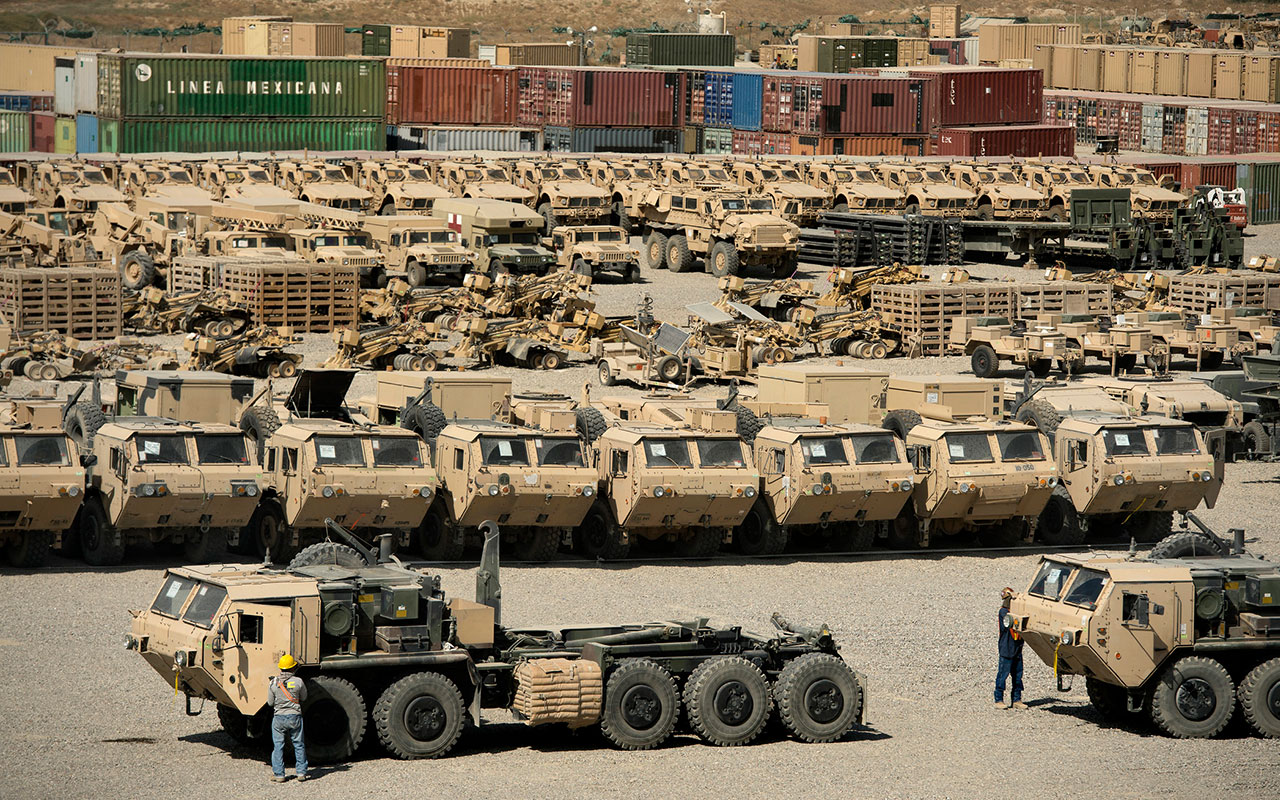
Profit and prosper with the best of Kiplinger's advice on investing, taxes, retirement, personal finance and much more. Delivered daily. Enter your email in the box and click Sign Me Up.
You are now subscribed
Your newsletter sign-up was successful
Want to add more newsletters?

Delivered daily
Kiplinger Today
Profit and prosper with the best of Kiplinger's advice on investing, taxes, retirement, personal finance and much more delivered daily. Smart money moves start here.

Sent five days a week
Kiplinger A Step Ahead
Get practical help to make better financial decisions in your everyday life, from spending to savings on top deals.

Delivered daily
Kiplinger Closing Bell
Get today's biggest financial and investing headlines delivered to your inbox every day the U.S. stock market is open.

Sent twice a week
Kiplinger Adviser Intel
Financial pros across the country share best practices and fresh tactics to preserve and grow your wealth.

Delivered weekly
Kiplinger Tax Tips
Trim your federal and state tax bills with practical tax-planning and tax-cutting strategies.

Sent twice a week
Kiplinger Retirement Tips
Your twice-a-week guide to planning and enjoying a financially secure and richly rewarding retirement

Sent bimonthly.
Kiplinger Adviser Angle
Insights for advisers, wealth managers and other financial professionals.

Sent twice a week
Kiplinger Investing Weekly
Your twice-a-week roundup of promising stocks, funds, companies and industries you should consider, ones you should avoid, and why.

Sent weekly for six weeks
Kiplinger Invest for Retirement
Your step-by-step six-part series on how to invest for retirement, from devising a successful strategy to exactly which investments to choose.
Handicapping stocks isn’t exactly easy right now. The echoes of the federal government’s infrastructure spending plan unveiling still are ringing, and investors are trying to determine whether early February’s correction was just a short-term hiccup. Even if the tide does continue to rise, it may not lift all boats in 2018 the way it did in 2017.
One group should shine regardless of what the future holds, however: defense stocks. Joe Quinlan, Managing Director and Chief Market Strategist at U. S. Trust, Bank of America Private Wealth Management, recently said, “The global demand for weapons has never been stronger, in our opinion. Global military spending is on a secular upswing, and expected to hit $1.67 trillion in 2018 – a 3.3% rise from the prior year and a level of spending not seen since the Cold War era.”
Moreover, President Donald Trump has made expanding and upgrading the country’s military a priority. Next fiscal year’s proposed defense spending is 10% greater than recent annual spending allocations – a massive increase by military standards.
The government’s spending plan and projected demand bode well for all makers of military hardware and providers of military logistics services. However, there are a handful of defense stocks that are better-positioned than others to capitalize on the planned spending growth.
Data is as of Feb. 26, 2018. Dividend yields are calculated by annualizing the most recent quarterly payout and dividing by the share price. Companies are listed alphabetically. Click on ticker-symbol links in each slide for current share prices and more.

Harris
- Market value: $18.9 billion
- Dividend yield: 1.4%
The average investor would be hard-pressed to name just one product made by Harris (HRS, $159.54). However, the world would miss the company tremendously if it went away.
Harris makes technology that makes air traffic management possible, facilitates weather forecasting, keeps people on the ground connected with satellites orbiting the earth and more. The imager affixed to a weather satellite scheduled for launch in early March includes the world’s most advanced weather imaging technology, and it just so happens to be made by Harris.
That’s just the civilian side of its menu. The Department of Defense likes Harris’ tactical communications solutions, its surveillance and reconnaissance capabilities, and its avionics platforms just to name a few.
That’s why, despite the utmost importance of Harris’ hardware, you rarely ever hear about it. But analysts are plenty familiar, and they like what they know. With defense spending set to rise in earnest come next year, the analyst community is calling for revenue growth of a little more than 6%. That’s expected to drive per-share profits up 19%, from this year’s estimate of $6.48 to $7.75 in 2019.
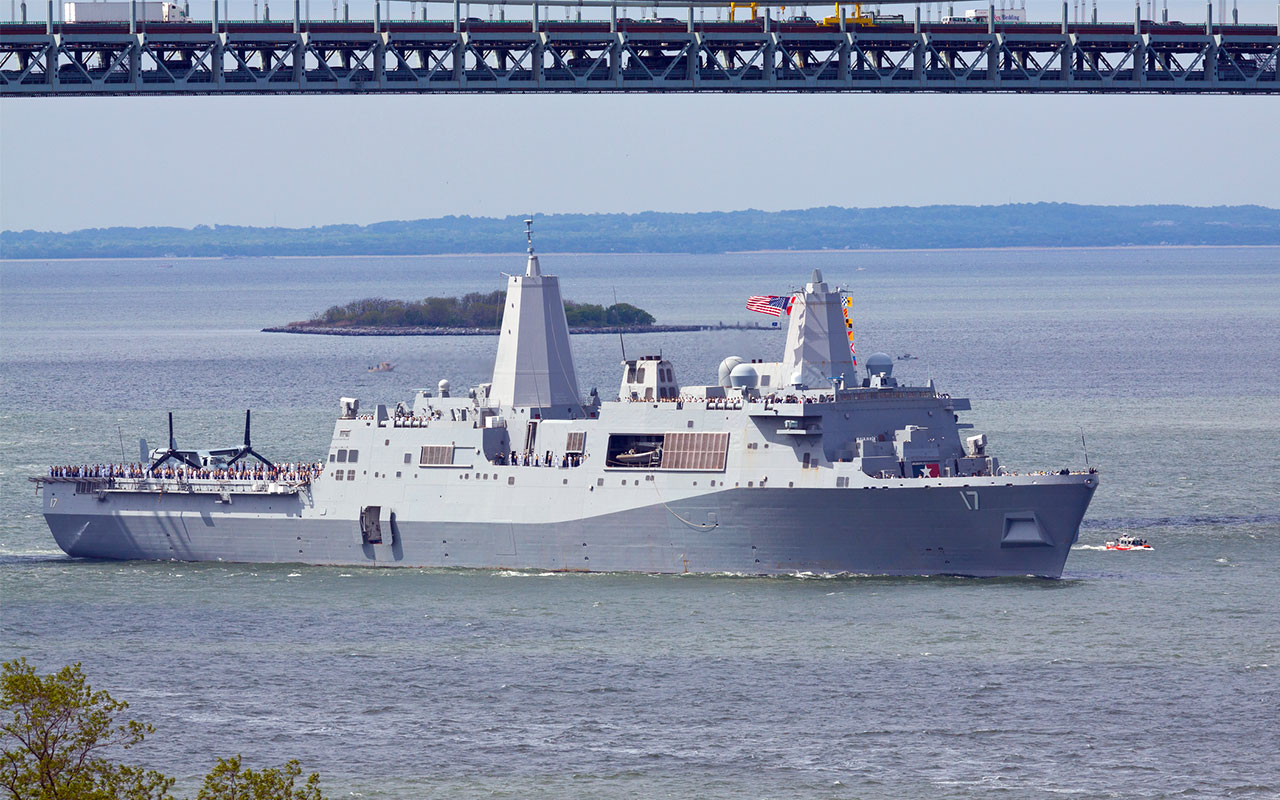
Huntington Ingalls Industries
- Market value: $12.0 billion
- Dividend yield: 1.0%
Most investors can name several defense-related stocks off the top of their head. Huntington Ingalls Industries (HII, $266.17) usually isn’t one of those names that comes to mind.
Maybe it should be.
This roughly $12 billion company is the nation’s busiest builder of military ships, recently delivering the amphibious Portland (LPD 27) – a 684-foot monster – to the U.S. Navy. It continues to work on the John F. Kennedy (CVN-79), an aircraft carrier that, once completed, will measure more than 1,000 feet end-to-end and carry more than 80 combat aircraft.
That’s just the beginning of what Huntington brings to the table for the Navy, and for its shareholders. Cowen analyst Gautam Khanna explained of his recent upgrade, “Congressional support for an expanded Navy fleet is high, & stellar execution at Ingalls makes a continuation of key programs likely.”
Cowen upgraded HII to "Outperform" from "Market Perform," saying that the stock was "excessively discounted versus its large-cap defense peers." Khanna expects that people will begin to notice HII more after the 2019 defense budget request and Feb. 15 earnings report, where she expected earnings estimates to rise thanks to tax reform.
That Feb. 15 earnings report was a good one, too. Huntington Ingalls topped profit estimates thanks to a 4% improvement in its top line.

Leidos Holdings
- Market value: $10.0 billion
- Dividend yield: 1.9%
Daniel Milan, a managing partner of Birmingham, Michigan-based Cornerstone Financial Services, concedes that Leidos Holdings (LDOS, $66.40) “may not be as recognizable as some of the bigger names in the sector.” But he also believes that “as technology advances, this company should reap the benefits. They provide technology and system engineering services and solutions in the defense, intelligence and health markets as well as a few others.”
Leidos does a little of everything, but its flagship military product is a platform called Command and Control, or C2. Calling it software doesn’t do it justice, as it’s so much more. C2 provides a means of planning all aspects of a military operation, from personnel deployment to weapons procurement to the establishment of communications – things you never see done in military movies, but are crucial to any successful real-life endeavor.
It also has captured the attention of some rather impressive partners. Leidos – along with Verizon (VZ), International Business Machines (IBM) and Unisys (UIS) – are teaming up to try to win the contract for the U.S. Navy’s Next Generation Enterprise Networks Re-compete (NGEN-R) Service Management, Integration and Transport (SMI&T) program. If won, this deal could be fruitful for lesser-known LDOS.
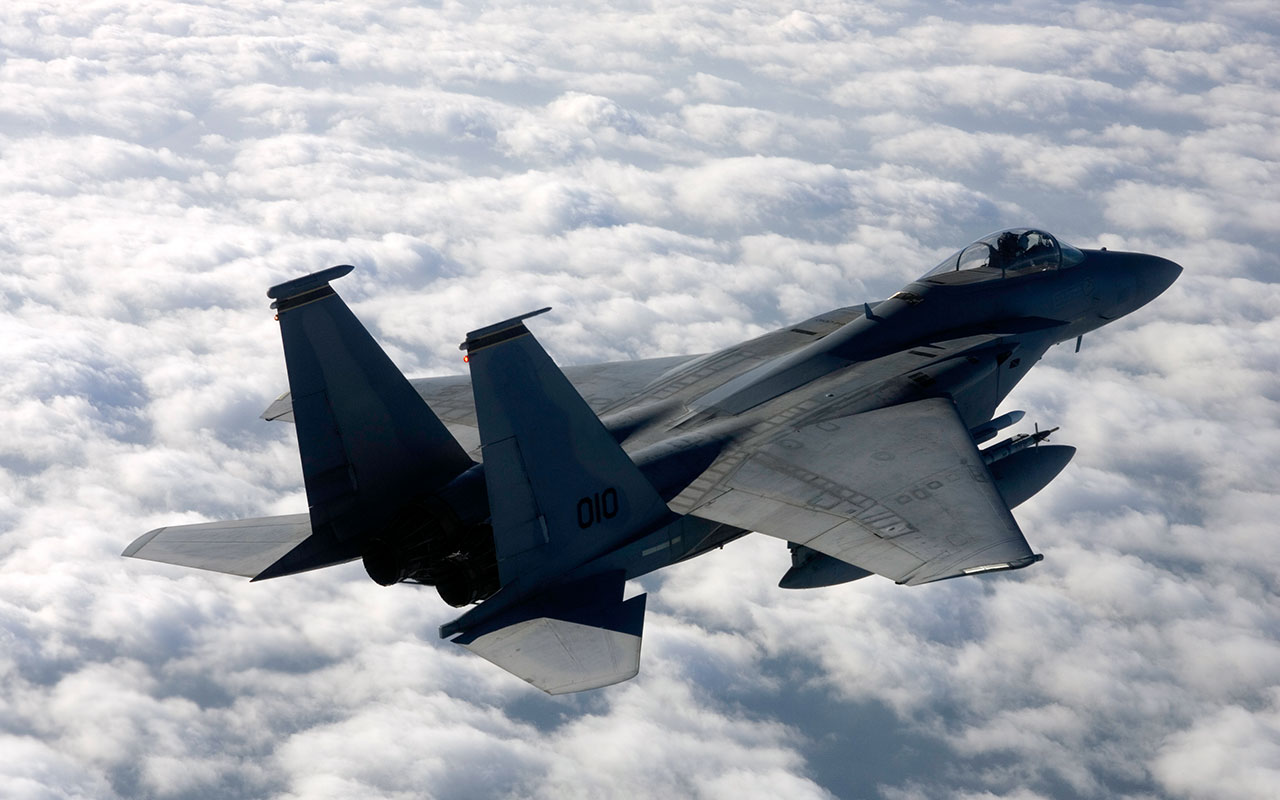
Lockheed Martin
- Market value: $102.7 billion
- Dividend yield: 2.1%
- Lockheed Martin (LMT, $358.70) has had more than its fair share of public-relations woes of late. It’s still one of the country’s biggest and best suppliers of defense systems, but its F-35 fighter jet program is well behind its original schedule, and well over budget.
Still, the Department of Defense thinks the plane is worth waiting on and worth funding. The Pentagon is requesting $10.7 billion to buy 77 of the super-jets during the government’s next fiscal year now that its production pace – and the jet’s reliability – has normalized.
That’s enough of a reason for Todd S. Lowenstein, Director of Research for HighMark Capital Management, to name Lockheed as one of his favorite defense picks. He notes, “The company is accelerating its key F-35 production program and looks to double output, significantly reduce costs and improve its margin structure going forward.”
Lowenstein added to his thesis that “Significant presence in missile defense is an underappreciated growth area for the company both domestically and abroad,” underscoring the surprising effectiveness of the plane as a mobile missile sensor.
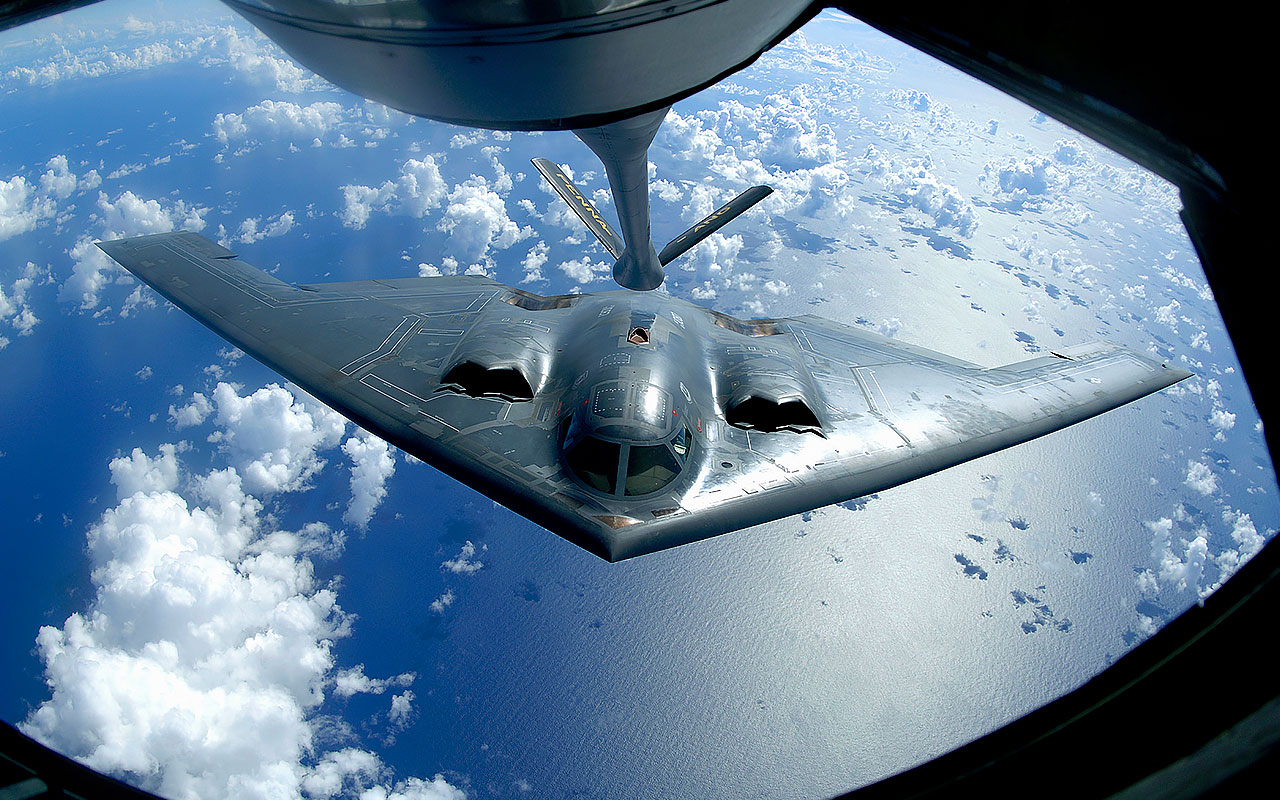
Northrop Grumman
- Market value: $62.1 billion
- Dividend yield: 1.1%
Although Lockheed Martin gets the bulk of the credit for making the F-35 a reality, it didn’t do it alone. Northrop Grumman (NOC, $355.09) helped out in a big way, making (among other parts) the center fuselage for some variants of the F-35. In the meantime, Northrop Grumman continues to develop the B-21 bomber – a next-generation version of the existing B-2 bomber – and still is cranking out support aircraft such as the E-2D and the Triton UAV.
That’s just the beginning of the company’s diverse menu of defense hardware. Lowenstein explains that Northrop Grumman “is a powerhouse operator and one of the best positioned defense companies with broad revenue exposure to key spending priorities including Intelligence Surveillance and Reconnaissance, Autonomous, Cyber, Logistics, and Bombers... Northrop Grumman’s focus on technology, costs and pensions during downturn has positioned them to be low cost leader, enabling new project wins.”
Lowenstein added to his bullish thesis, “We expect NOC’s free cash flow profile to improve after strategic capital investments wind down allowing for accelerating capital returns to shareholders.”
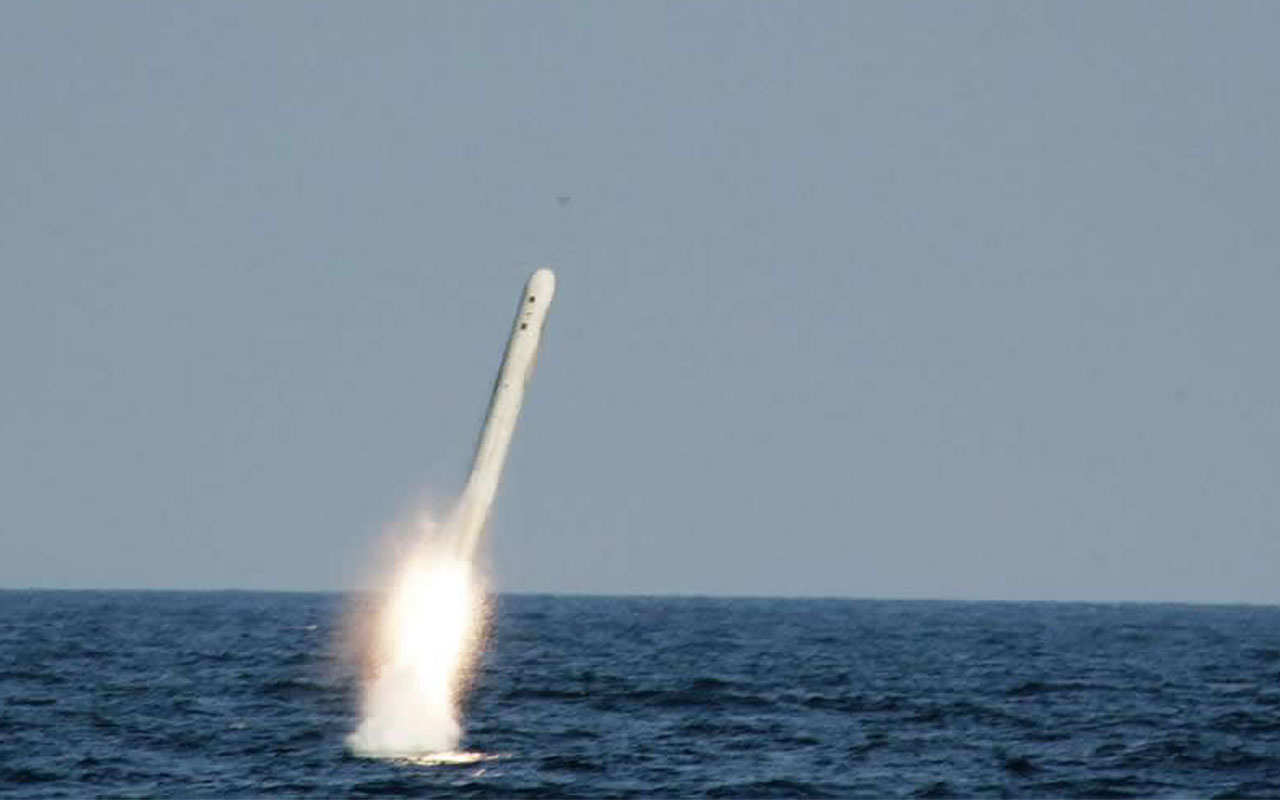
Raytheon
- Market value: $63.9 billion
- Dividend yield: 1.5%
Defense contractor Raytheon (RTN, $219.86) hasn’t exactly been a crowd-pleaser of late. Although its fourth-quarter earnings of $2.03 per share were a penny better than expected, revenue of $6.8 billion came up short of estimates.
Earlier this month, Bloomberg reported that research firm MITRE Corp. wrote that Raytheon “demonstrated an inability to accurately project cost and schedule,” referring to a new Global Positioning System being built for the Air Force. Then, just a few days ago, the company disclosed that CEO Thomas Kennedy shed nearly $10 million worth of Raytheon stock, sending an alarming message to shareholders who had remained faithful through a couple of tough quarters.
But RTN still belongs on the short list of defense stocks to buy.
Raytheon offers a variety of services and technologies to the U.S. military and its allies all over the planet. Not one of them is a high-profile project like the F-35 or the Tomahawk cruise missile. But, most all of them are critical to keeping our armies up and running. Command control systems, cyber warfare, sensors, electronic warfare and even training services – these are services and hardware the military isn’t going to stop buying.

Spirit AeroSystems
- Market value: $10.6 billion
- Dividend yield: 0.4%
- Spirit Aerosystems (SPR, $92.11) isn’t readily recognized as a defense investment. And truth be told, it’s not the crux of its business. The company makes a large portion of the structures used in passenger jets built by Boeing (BA) and Airbus (EADSY).
Spirit still is crucial to the Department of Defense, however, in that it also fabricates parts of the Sikorsky helicopters favored by most of the United States Armed Forces, as well as pieces of the Osprey – a half-helicopter/half-airplane craft that provides the ultimate in flexibility when it comes to ferrying military cargo and personnel. Spirit also is involved in the development of the aforementioned B-21 bomber, producing some components of the stealth bomber for Northrop Grumman.
But pay attention to the less dramatic things Spirit does, because those should keep its top and bottom lines growing consistently. SPR is an expert fabricator and supplier of special-made materials that civilian companies and the military need, but the average consumer never thinks about.
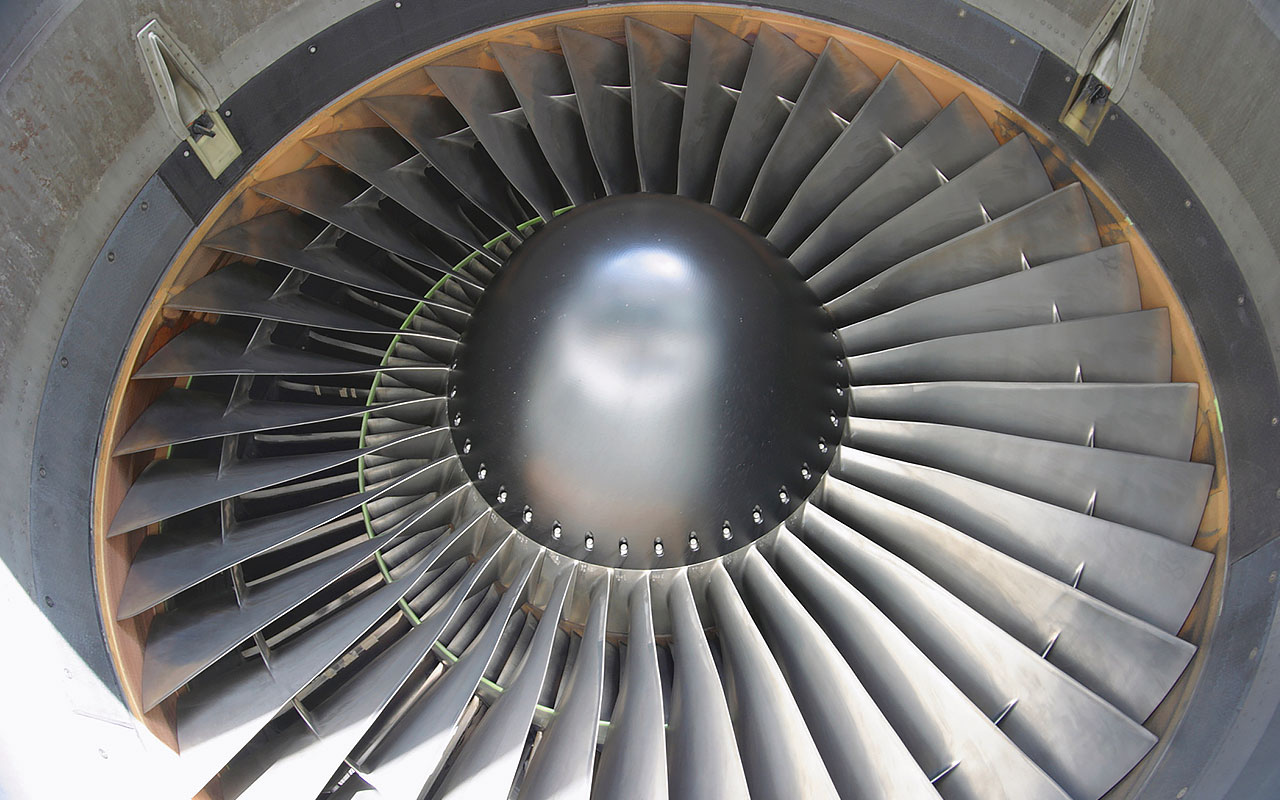
United Technologies
- Market value: $108.9 billion
- Dividend yield: 2.0%
Just because a company makes military hardware or provides logistics solutions to the Department of Defense doesn’t mean that’s the only thing that company can or should so. Indeed, in that defense-spending can also be cyclical, it’s wise for these outfits to diversify outside of the defense sphere.
Enter United Technologies (UTX, $135.47). Fraj Lazreg, Portfolio Manager of Investors’ Advantage Portfolios, likes the deep and wide portfolio of products that UTX brings to the table, explaining that its major divisions are “industry groups that operate independently and complement each other through the various economic cycles.” Those core units are, by the way, Pratt & Whitney, which manufactures and services commercial and military aircraft engines; Otis, the world’s largest manufacturer and servicer of elevators and escalators; and UTC Climate, which makes heating, ventilation and air conditioning equipment; and UTC Aerospace Systems.
If the company does end up splitting itself into three standalone entities, as CEO Greg Hayes has said he's mulling, the defense segment of the company is its Pratt & Whitney jet engine arm and UTC Aerospace Systems. Those units stand to benefit the most from the broad expansion of defense-related spending.
For now, however, the product mix allows for steady sales and earnings growth. Last year’s organic revenue growth of 4.0% is to be followed by top-line growth of 5.8% this year and 5.9% growth next year. Earnings are growing at an even better clip.

Verint Systems
- Market value: $2.6 billion
- Dividend yield: N/A
Add Verint Systems (VRNT, $40.10) to your list of defense stocks that could end up being fruitful picks.
Steven Schoenfeld, founder and CIO of BlueStar Indexes, a research firm that powers two U.S.-traded ETFs focused on Israel, is a fan of the company for one simple but oft-overlooked reason. Much like Leidos Holdings, Verint makes it possible for the U.S. and its allies to fight a real 21st century war.
Schoenfeld explains, “Verint is a leader in the ‘actionable intelligence’ space. This is compelling because it highlights the company’s expertise. That is, the ability to make use of unstructured data and layer on analytics that better enable users to anticipate and respond to security threats in real time.”
One example of how Verint is making the world a safer place is the service it provides to African national security agencies. The use of Verint’s Web Intelligence tools allows governmental forces to effectively track the recruitment of members into terrorist groups, offering details and insights about how they do so and allowing authorized agencies to garner critical information about those recruits.
As terrorism becomes a more digital threat, Verint Systems becomes more important in the fight against it.

iShares US Aerospace & Defense ETF
- Market value: $6.0 billion
- Dividend yield: 0.9%*
- Expenses: 0.44%
Many investors may seek out a specific defense stock or two as a way to play the looming increase in defense spending. But that’s not the only viable solution. It may be just as easy (and perhaps wiser) to simply jump into an exchange-traded fund that that owns a piece of all the key defense-related names.
TradingSyndicate’s Reuben Rosado likes the Direxion Daily Aerospace & Defense Bull 3X Shares (DFEN). He notes, “This ETF is designed to provide 300% of the performance of the Dow Jones U.S. Select Aerospace & Defense Index. So by holding it you get the diversification benefit of buying the entire index.” That’s an aggressive trading strategy, but naturally, it’s not right for everyone. Though by design it outperforms the defense sector as a whole should these names collectively rise, that design also means it will lose far more ground than the group will should these stocks perform poorly.
A far less volatile ETF in the vein of Rosado’s idea is the iShares US Aerospace & Defense ETF (ITA, $205.30). It only mirrors the performance of the aforementioned index, for better or worse, rather than augments that performance. The fund invests in roughly 40 defense stocks spanning most of the picks we’ve covered already, as well as additional picks such as Boeing, Rockwell Collins (COL) and Textron (TXT).
Whatever the case, if you’re a firm believer that we’re on the cusp of a major uptick in military and defense spending, this fund could be a simple yet powerful way to play it.
*Yields represent the trailing 12-month yield, which is a standard measure for equity funds.
Profit and prosper with the best of Kiplinger's advice on investing, taxes, retirement, personal finance and much more. Delivered daily. Enter your email in the box and click Sign Me Up.

-
 Dow Adds 1,206 Points to Top 50,000: Stock Market Today
Dow Adds 1,206 Points to Top 50,000: Stock Market TodayThe S&P 500 and Nasdaq also had strong finishes to a volatile week, with beaten-down tech stocks outperforming.
-
 Ask the Tax Editor: Federal Income Tax Deductions
Ask the Tax Editor: Federal Income Tax DeductionsAsk the Editor In this week's Ask the Editor Q&A, Joy Taylor answers questions on federal income tax deductions
-
 States With No-Fault Car Insurance Laws (and How No-Fault Car Insurance Works)
States With No-Fault Car Insurance Laws (and How No-Fault Car Insurance Works)A breakdown of the confusing rules around no-fault car insurance in every state where it exists.
-
 The 24 Cheapest Places To Retire in the US
The 24 Cheapest Places To Retire in the USWhen you're trying to balance a fixed income with an enjoyable retirement, the cost of living is a crucial factor to consider. Is your city the best?
-
 5 Stocks to Sell or Avoid Now
5 Stocks to Sell or Avoid Nowstocks to sell In a difficult market like this, weak positions can get even weaker. Wall Street analysts believe these five stocks should be near the front of your sell list.
-
 Best Stocks for Rising Interest Rates
Best Stocks for Rising Interest Ratesstocks The Federal Reserve has been aggressive in its rate hiking, and there's a chance it's not done yet. Here are eight of the best stocks for rising interest rates.
-
 The Five Safest Vanguard Funds to Own in a Volatile Market
The Five Safest Vanguard Funds to Own in a Volatile Marketrecession The safest Vanguard funds can help prepare investors for market tumult but without high fees.
-
 The 5 Best Inflation-Proof Stocks
The 5 Best Inflation-Proof Stocksstocks Higher prices have been a major headache for investors, but these best inflation-proof stocks could help ease the impact.
-
 5 of the Best Preferred Stock ETFs for High and Stable Dividends
5 of the Best Preferred Stock ETFs for High and Stable DividendsETFs The best preferred stock ETFs allow you to reduce your risk by investing in baskets of preferred stocks.
-
 What Happens When the Retirement Honeymoon Phase Is Over?
What Happens When the Retirement Honeymoon Phase Is Over?In the early days, all is fun and exciting, but after a while, it may seem to some like they’ve lost as much as they’ve gained. What then?
-
 5 Top-Rated Housing Stocks With Long-Term Growth Potential
5 Top-Rated Housing Stocks With Long-Term Growth Potentialstocks Housing stocks have struggled as a red-hot market cools, but these Buy-rated picks could be worth a closer look.
